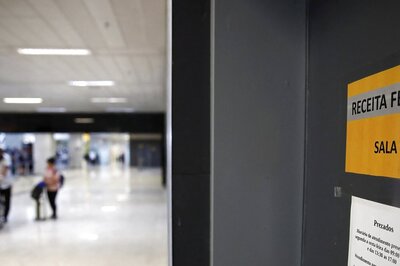
views
In the last session of the 16th Lok Sabha, something unprecedented happened. The Opposition managed to stall even debate on the Motion of Thanks to the President’s Address. The Opposition all through the past five years ensured ‘dysfunctional’ Parliament, courtesy their majority in Rajya Sabha.
The first session of the 17th Lok Sabha begins this week. The start would be marked by the customary oath-taking followed by the election of the Speaker. The actual business would only begin after the President addresses joint session of both the Houses.
Though the treasury benches have returned stronger in the Lok Sabha, a somewhat of a status quo remains in Rajya Sabha with the ruling benches not expected to get more numbers than the Opposition till the second half of 2020.
The question is, would the Opposition continue to play politics of spoilsport or engage in sporty debates to put the government on the mat.
The problem with the Indian Parliament, especially in the past decade, has been that the parliamentarians have taken to the television cameras rather the floor of the House to express their viewpoint. The lure of the camera has not just infected the junior members, but also party’s leadership.
In the past five years, and the years before that when the BJP was in the Opposition, the practice has been to stall House proceedings and walk to the hut of waiting camerapersons just outside the main Parliament building. In fact, Congress president Rahul Gandhi walking across the aisle to the treasury benches and embracing Prime Minister Narendra Modi was more of an act for the camera than a statement for the floor of Parliament.
The itch of television is dangerous. Gandhi should have had his revenge on the floor of the House, where the parliamentary norms provide him the opportunity of going beyond the grammar of pulp politics and establish credibility as a parliamentarian. Regrettably, he failed at that.
It’s an unfortunate state for the country where the principal Opposition was unable to rise to the challenge of articulating a well-argued position against the government; one-liners like ‘Sach Bharat’ versus ‘Swachh Bharat’ were of not much consequence.
The Congress has to identify issues for long-drawn battles instead of resorting to the politics of shoot-and-scoot, which is patented by the Aam Aadmi Party and suits their repertoire best.
The challenge for the Congress party last time around was to take the government to task on issues of development, in asking questions about “achhe din”, and not allowing them the escape route of identity politics. The Congress must realise that after the defeat in 1999, the party rebuilt itself brick-by-brick. It should do the same now. There are no shortcuts as Sonia Gandhi had found out in the 1990s when Mulayam Singh Yadav refused to support her as Prime Minister.
Last time around, in its enthusiasm to block the Triple Talaq and Citizenship (Amendment) bills, it completely paralysed the functioning of the Rajya Sabha ensuring that politically innocuous but administratively important legislations like the Indian Medical Council Bill, the Extension of Municipalities Bill, the Seeds Bill, the Pesticides Management Bill, the Archaeological Monuments Bill and the Motor Vehicles Bill, too, gathered dust. The report of the Select Committees on some of the bills, too, were not allowed to be tabled.
During a TV panel discussion about four years ago, while interacting with Ghulam Nabi Azad, who is the Leader of Opposition in the Rajya Sabha, this writer had invited the seasoned politician’s wrath when pointed out that the Congress had adopted a lethargic strategy of opposing the government through subversion of parliamentary politics.
“Let me assure you, they (the government) would not have a majority in the House (Rajya Sabha) till 2018 and after that it would be a lame duck government,” Azad had angrily said. If we examine this closely, and in a lighter vein, it would have been be more appropriate for the BJP to mouth Arvind Kejriwal’s line, “Woh pareshan karte rahe, hum kaam karte rahe (They kept bothering us, but we kept working).”
In fact, during the poll campaign, Modi did manage to put across this message to the voters.
For example, on the Rafale front, stalling Parliament on the acquisition of the aircraft proved to be ineffective. There was a lesson for the Congress in what happened after the fall of Atal Bihari Vajpayee government by one vote in 1999. The lame duck government under Vajpayee led the country to a massive victory in Kargil war, making the whole nation celebrate it even as the Congress sulked over it.
There were even protests by Congress cadre on what they called government’s failure to prevent intrusion. The Congress leadership then thought it was effectively exposing the government, but instead it made people rally behind Vajpayee’s leadership. Twenty years down the line, on the issue of Pulwama-Balakot, people rallied behind Narendra Modi.
The challenge for any leader is to make his team rise from the ashes like the phoenix. Unfortunately, the Congress so far has been left grappling with its dilemma of whether it needs to continue with the status quo of reposing faith in a model, which is increasingly redundant, moth-eaten and emasculated by the infirmities of its leadership, or whether to dismantle it. The collective party leadership has to energetically innovate to regain its lost position of prominence.
Congress has a chance to rebuild its image of being a party of parliamentarians, it should grab the opportunity. They must learn that the policy of paralysing Parliament has emaciated them of political credibility. It’s time they regained it.
(The author is a senior journalist and political analyst. Views are personal)


















Comments
0 comment